by Chris Horner
The crisis consists precisely in the fact that the old is dying and the new cannot be born; in this interregnum a great variety of morbid symptoms appear. —Gramsci
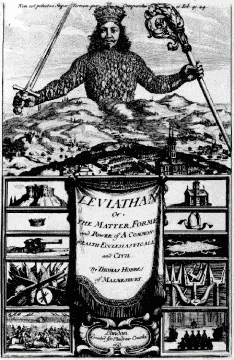
Does a crisis show us what we are ‘really like’? Whether it does or not, it has already been instructive to experience this one, in which our institutions are being stress tested, perhaps to destruction. As many have noted, COVID-19 is a political and economic crisis as well as a medical one. Its size and complexity can leave us groping around for the right interpretive and predictive tools. There are a number of models that we can turn to to help us understand how we react, or might react, and these often rest on assumptions about ‘human nature’. The problem is that they don’t agree on some basics, and thus can’t all be right. So which is the best one to turn to in a crisis?
Two Views of Human Nature
The view of humans and their social arrangements associated with Thomas Hobbes (1588-1679) is a bleak one: the human animal in the ‘state of nature’ – that is, without government or law – is in a state of constant war, or preparation for war, since no one can be sure of their own security. In the state of nature, life is ‘continual fear, and danger of violent death; and the life of man, solitary, poor, nasty, brutish, and short’ (Leviathan, chapter XIII, 1651). Only a strong sovereign power can ensure peace by imposing it through force, or the threat of force. If the civil and political bonds of such a peace are broken, we can expect people to revert to type as self interested individuals, with “war of all against all” (bellum omnium contra omnes ): a return to the state of nature triggered by the breakdown of the central authority, driven by fear of the other and only restored by force or the threat of force.
Plenty of fictional treatments seem to tell us this is what we should expect, given the ‘right’ circumstances – from novels like Golding’s Lord of the Flies, much of the mid to late work of JG Ballard, and Soderbergh’s rather relevant film Contagion (2011) about a killer virus pandemic, the collapse of civil authority and the return of the repressed savage in all of us. In the end, only force, or the authority that comes with the possession of power, can restore order. So the stripping of supermarket shelves and the much documented fights in the aisles between angry shoppers, might be early harbingers of much worse to come. But perhaps it’s a bit early to assume that.
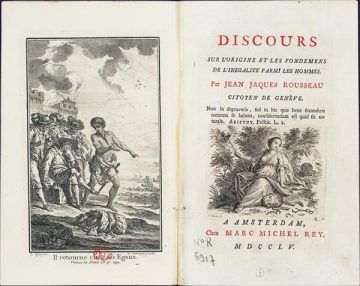 Jean-Jacques Rousseau criticised the account Hobbes gives of ‘man in the state of nature’ and it is instructive to consider what he has to say in his Discourse on Inequality (1754). According to Rousseau, Hobbes begins his story too late in the day, as it were. The picture of warring humans posits a society in which inequality and scarcity have provoked conflict between the haves and have-nots, a war that is only ended when the rich impose a false social contract on the poor. But this war isn’t an expression of an unruly human nature: before we got to that point, we were capable of cooperation and the virtues of community and sympathy that arise in what he calls ‘nascent society’, a condition somewhat resembling loose, non-hierarchical communes. If this is anarchy, it is a much more benign variety than the one Hobbes supposes us to have at our heels in his account of the state of nature. Rousseau gives both a positive message and a warning: we aren’t ‘naturally’ good or bad, but rather malleable to circumstance. Social arrangements can be conducive to conflict or cooperation. We can do terrible things to each other when we are frightened or hungry but if we change the way we live together, we can do better, much better. This might even be true in a pandemic, and we get some sense of this in Contagion, as Soderbergh’s film doesn’t just show violence and the breakdown of order, the rule of the gun and club; it also depicts selfless individuals, particularly scientists and medical people, working for the common good, risking and even sacrificing their lives that others might live. And in the end a vaccine is found. Homō hominī lupus est (‘man is wolf to man’) needn’t be our fate.
Jean-Jacques Rousseau criticised the account Hobbes gives of ‘man in the state of nature’ and it is instructive to consider what he has to say in his Discourse on Inequality (1754). According to Rousseau, Hobbes begins his story too late in the day, as it were. The picture of warring humans posits a society in which inequality and scarcity have provoked conflict between the haves and have-nots, a war that is only ended when the rich impose a false social contract on the poor. But this war isn’t an expression of an unruly human nature: before we got to that point, we were capable of cooperation and the virtues of community and sympathy that arise in what he calls ‘nascent society’, a condition somewhat resembling loose, non-hierarchical communes. If this is anarchy, it is a much more benign variety than the one Hobbes supposes us to have at our heels in his account of the state of nature. Rousseau gives both a positive message and a warning: we aren’t ‘naturally’ good or bad, but rather malleable to circumstance. Social arrangements can be conducive to conflict or cooperation. We can do terrible things to each other when we are frightened or hungry but if we change the way we live together, we can do better, much better. This might even be true in a pandemic, and we get some sense of this in Contagion, as Soderbergh’s film doesn’t just show violence and the breakdown of order, the rule of the gun and club; it also depicts selfless individuals, particularly scientists and medical people, working for the common good, risking and even sacrificing their lives that others might live. And in the end a vaccine is found. Homō hominī lupus est (‘man is wolf to man’) needn’t be our fate.
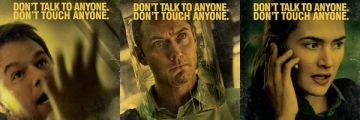
The Neoliberal Utopia
But what are the social conditions, what is the political economy that would that encourage the virtues of cooperation and trust? Not, I think, the ones our rulers have pursued in the last forty years or so. The rational chooser, the self-interested individual or citizen-consumer, has been an ideal model for a sort of political economy since at least Hobbes’ time. Since the 1970s, the latest version of this has been the ‘neoliberal subject’. The context in which this individual emerges is one in which the state is shrunk to its minimal role (ideally, just police and army), leaving public social provision (most relevantly here, healthcare, but really all public services) scanty or non-existent. Marketisation is extended to nearly all aspects of life and the individual is remodelled with a moralising discourse that preaches the gospel of self reliance and self improvement. The individual is the entrepreneur of the self, living her life like a start-up, a small company in which personal assets are exploited, and a cost/benefit criterion applied to all activities from going to the gym, finding a partner, and of course, a successful career.
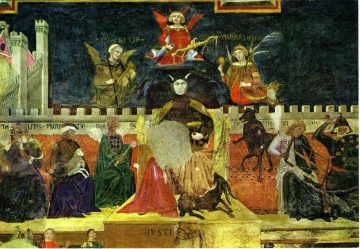
That, at least, is the stereotype, but it has never quite worked out like that. This is partly because the anti-state rhetoric hasn’t amounted to more than ideological mood music accompanying the stripping of public assets by private interests. The beneficiaries of the new dispensation have, far from shrinking the state, actually used it as a cash cow to enrich themselves, especially through privatisation. These are the new enclosures, an accumulation of value through the dispossession of the commons. Another role for the neoliberal state, supported by a compliant media, is to be the engineer of human souls, bending the lives of individuals into the shape of the permanently indebted, endlessly consuming entrepreneur of the self. This role for the state as enabler for private interests is a key aspect of neoliberalism.
Politics itself is taken out of the hands of the consumer-citizen and re-presented as a kind of spectacle, starring presidents and prime ministers of the ‘sinister buffoon’ type. These pseudo-populists serve rather than challenge the elites who are the real beneficiaries of a system in which markets, rather than democracies, decide things. Thus the withdrawal of citizens from the political process and the growth of cynicism and voter apathy also suits the neoliberal order: liberty, equality and solidarity are replaced by comfort, security and health as the new ideals. Postmodern politics indeed: the language of the small state and of personal empowerment is not intended to conceal the manipulation. It happens in plain sight. Not much is hidden, since the chaos of multiple discourses and contradictory policies fits neatly into a post truth polity in which no one is quite sure what is really happening. But repressed truths have a tendency return in various ways. When the economy boomed it enriched the few rather than the indebted many, and the financialisation of the economy, with its spiralling debt, led to the collapse of 2008. The economy painfully and slowly managed to unlearn the lessons of that event, only to find a rather large new Event in 2020.
The Return of the Repressed
This time, it is repressed nature that is roaring back. For we are part of nature, whatever we take ‘human nature’ to be. We are creatures that breathe, live on a blue-green planet which we share with the everything from the largest mammals right down to the smallest things of all: the families of micro-organisms, including viruses, one of which is causing us some trouble right now. There has been a relentless pressure on the natural world, as capitalism has sought the perpetual growth it requires to survive. Global warming has been the most obvious and threatening consequence of this, occurring whether or not presidents Trump or Bolsonaro admit its existence. Now along comes COVID19 and we find ourselves short of effective resources to resist it. But if the dystopic nightmare is threatening it is because it has been conjured by the forces that currently shape our world, not by a return to some unchanging, wolfish, human nature.
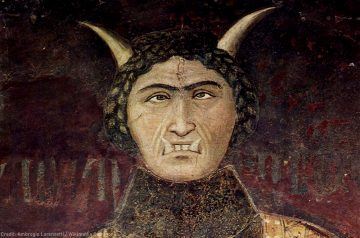 The neoliberal model of self and society never quite took hold. There were many reasons for this, but the one I want to emphasise here is the simplest and most important: it isn’t the truth of who we are. As the ideological production that it is, it produced the necessary rationalisation of what Wendy Brown called ‘the stripping of the demos’ but its big flaw was its untruth. This untruth is being exposed in a multitude of unmissable ways as I write this. It turns out that yes, we do need a state; it turns out that the state can do things; it also turns out that without the state, and the public that works to keep society going, that pays for and upholds it, the bloated finance sector and the entire capitalist system will go under completely. Suddenly, what was impossible becomes possible. The saying that ‘we can imagine the end of the world more easily than we can the end of capitalism’ has a new sense to it now that both, apparently, seem to be on the agenda.
The neoliberal model of self and society never quite took hold. There were many reasons for this, but the one I want to emphasise here is the simplest and most important: it isn’t the truth of who we are. As the ideological production that it is, it produced the necessary rationalisation of what Wendy Brown called ‘the stripping of the demos’ but its big flaw was its untruth. This untruth is being exposed in a multitude of unmissable ways as I write this. It turns out that yes, we do need a state; it turns out that the state can do things; it also turns out that without the state, and the public that works to keep society going, that pays for and upholds it, the bloated finance sector and the entire capitalist system will go under completely. Suddenly, what was impossible becomes possible. The saying that ‘we can imagine the end of the world more easily than we can the end of capitalism’ has a new sense to it now that both, apparently, seem to be on the agenda.
Antibodies
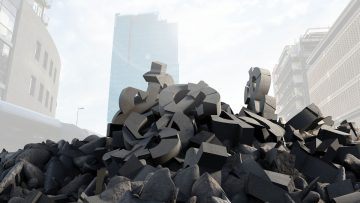 More: if one of the reactions to scarcity (or the fear of scarcity) is rampant self-interest, the opposite can also be seen. Capitalism needs the labour that makes value, but also the multitudes who work for little or no reward. One lesson taught us by COVID-19 is that workers, the ones whom make value, the doctors, nurses, cleaners, and the myriads of people working unpaid to support the elderly, the isolated and the vulnerable are what make society a place one can live in. Mutual help groups have sprung up in nearly every community. It appears that while the body politic has its pathologies, it also has antibodies, defences that we should note of and do everything we can to support. There is a deep sense of decency, a basic ethical substance by which, and in which, we live. This is what Hegel called sittlichkeit, the ethical substance of daily life that implies mutual recognition and reciprocity. Through it we are reminded that society does exist, and is something indispensable because it is at the heart of what we are: ‘political animals’. If it is the truth of who we are, then it is a truth arising from our history, rather than grounded in some unchanging human nature. We should recall, though, the way the neoliberal disaster of 2008 was turned into a way of further advancing neoliberalism. The same actors will attempt a similar trick with the current crisis if they can get away with it. If they do they will take us back to something at least as bad as what we had before, and probably much worse. We have to see that they don’t succeed in doing that, unless we want to see the real promoters of the Hobbesian nightmare back in charge of our fates.
More: if one of the reactions to scarcity (or the fear of scarcity) is rampant self-interest, the opposite can also be seen. Capitalism needs the labour that makes value, but also the multitudes who work for little or no reward. One lesson taught us by COVID-19 is that workers, the ones whom make value, the doctors, nurses, cleaners, and the myriads of people working unpaid to support the elderly, the isolated and the vulnerable are what make society a place one can live in. Mutual help groups have sprung up in nearly every community. It appears that while the body politic has its pathologies, it also has antibodies, defences that we should note of and do everything we can to support. There is a deep sense of decency, a basic ethical substance by which, and in which, we live. This is what Hegel called sittlichkeit, the ethical substance of daily life that implies mutual recognition and reciprocity. Through it we are reminded that society does exist, and is something indispensable because it is at the heart of what we are: ‘political animals’. If it is the truth of who we are, then it is a truth arising from our history, rather than grounded in some unchanging human nature. We should recall, though, the way the neoliberal disaster of 2008 was turned into a way of further advancing neoliberalism. The same actors will attempt a similar trick with the current crisis if they can get away with it. If they do they will take us back to something at least as bad as what we had before, and probably much worse. We have to see that they don’t succeed in doing that, unless we want to see the real promoters of the Hobbesian nightmare back in charge of our fates.
